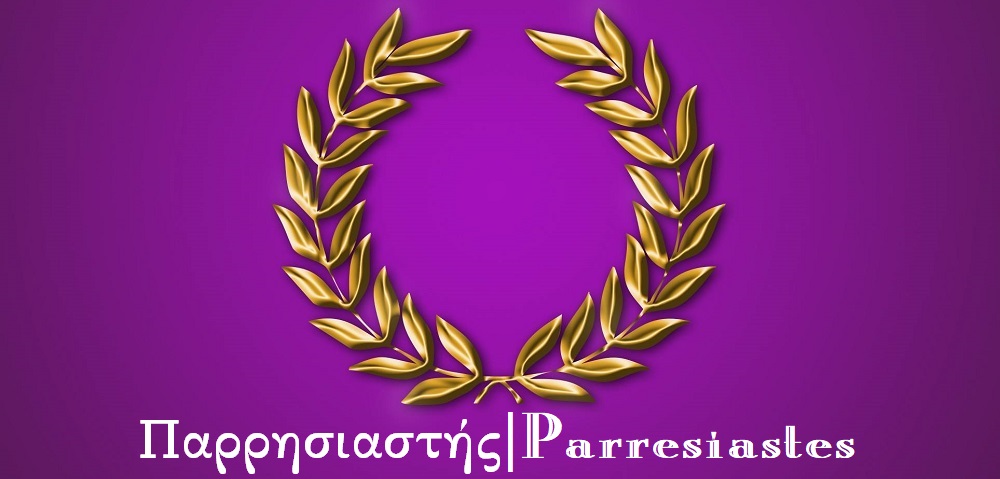First published on hellenismos.org on May 4, 2021.
 For some time now, Anglo-American pagans and occultists have
been trying to appropriate, exploit and harm the indigenous Hellenic culture
for various reasons, including profit and self-promotion.
For some time now, Anglo-American pagans and occultists have
been trying to appropriate, exploit and harm the indigenous Hellenic culture
for various reasons, including profit and self-promotion. However, since they have encountered resistance, they are spending a great deal of time slandering, agitating and spreading lies against ethnic Hellenes, especially those standing in their way and exposing their transgressions. So I took the trouble of translating some selected passages from Greek to English to neutralise some of the pagan lies against the Hellenic people.
In order to ensure the cultural appropriation and commercially driven distortion of Hellenism, pagan colonialists are moving beyond their standard marketing strategies.
They have started to attack, distort and publicly deny vital aspects of the Hellenic ethnic identity and history, such as the self-designation of many Hellenes or the historically proven genocide of the Greeks in the Ottoman empire. In this context, they seem to focus on the ethical denigration of the term «ethnic Hellene.» Ethnikoi Hellenes is the favored self-designation of those Greeks who abandoned Christianity and Romiosyni for their indigenous culture and religion.
The etymological root of the term ethnic or ethnos is ethos. The meaning of this word is «habit, character, custom, way of life» (it’s basically the Greek word for «culture»). Ethos also refers to the ethnic religion of the Greeks and the concept of eusebeia (piety), which means to worship the gods according to the customs of the ancestors. «Ethnic Hellene» means «Hellenic by ethos,» it is, as shown above, a religiously connoted ethno-cultural but also empowering self-designation, which has undergone a long and complex process.
While attempting to enforce their individual interests, pagan colonialists and imposters try to rationalize the cultural appropriation and exploitation of Hellenism by efforts to delegitimize the Hellenes‘ right to self-determination and their sovereignty over their own culture, for instance, by misrepresenting themselves as members of the Hellenic community. Step by step, through deception, defamation and distortion they pursue their objective. As such, they desire to link the self-designation «ethnic Hellenes» to the «Völkisch movement» and «folkism,» often described as a particular tendency or movement within paganism, which in itself shows the ethnocentrism behind this defamation strategy or «accusation,» since a) «folkism» designates a phenomenen within paganism, and b) the claim itself is an assessment of alterity, in our case Hellenism, based on the norms, categories and standards of their own culture. But their structural colonialism makes them immune to such details.
However, much more interesting is the fact that the «ethnic Hellene» is older than the «Völkisch movement,» which, of course, refutes the many implications made by pagan colonialists and Christian nationalists. The following quotes clearly demonstrate this truth:
«διατί ήσαν εθνικοί
Έλληνες [because they were ethnic Hellenes]»
(Athanasios Parios, Αλεξίκακον Φάρμακον, p. 58, Leipzig 1818)
«Τελευταίον, και
αυτοί οι Εθνικοί Ελληνες … [And finally, these ethnic Hellnenes too …]»
(Konstantinos Oikonomos: Περί των Ο‘ Ερμηνευτών της Παλαιάς Θείας Γραφής, p.
298, Vol. 4, Ch. 4, Athens 1844)
«τους Πλατωνικούς
φιλοσόφους και οί εθνικοί Ελληνες … [platonic philosophers and the ethnic
Hellenes …]»
(Margaritis Dimitsas: Ιστορία της Αλεξανδρείας, p. 696, Athens 1885)
«οι εθνικοί Έλληνες
ησπάσθησαν τον Χριστιανισμόν, και οι ναοί των ειδώλων μετετράπησαν είς
χριστιανικούς, η δε εθνική φιλοσοφία έγένετο χριστιανική … [the ethnic Hellenes
converted to Christianity, and the temples of the idols were transformed into
Christian churches; the ethnic philosophy became Christian …]»
(G. I. Papadopoulos: Λόγος Πανηγυρικός εκφωνηθείς τη 4 Δεκεμβρίου 1899 κατά την
επέτειον εορτήν του Εκκλησιαστικού Μουσικού Συλλόγου, p. 5, Constantinople
1900)
«οί εθνικοί έλληνες
… [the ethnic Hellenes …]»
(Patriarchate of Alexandreia and of all Africa: Εκκλησιαστικός Φάρος, p. 221,
Alexandria 1908)
«Πανταχού δέ οί
εθνικοί Ελληνες ήνοιξαν ενθουσιωδώς τούς κεκλεισμένους αυτών ναούς … [The
ethnic Hellenes opened their closed temples everywhere …]»
(Panagiotis Ch. Doukas: H Σπάρτη δια μέσου των αιώνων, p. 351, New York 1922)
See also: Autochthonous, Indigenous, Ethnic, Native, Hellenic
When «Hellenists»
who don’t speak Greek talk in a pagan group called «Hellenismos» [!] about a
culture they don’t know, interpret the past of that culture through the lens of
their own stereotypes or questionable desires, and attempt to speak on behalf
of a community they don’t belong to, resistance becomes a duty. The damage
caused to Hellenes and Hellenists by the pagan counter-enlightenment will last
only temporary. In the end, it will hurt them more than us. Because, in doing
what they are doing, the only thing they achieve is to reveal to the world who
they really are.
